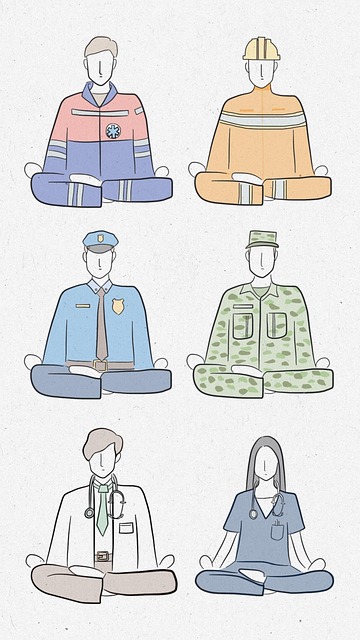Chronic stress in young adults, driven by academic pressures, financial woes, and social expectations, can lead to severe mental health issues and physical ailments. Effective solutions involve specialized therapy focused on symptoms and underlying factors, particularly in healthcare settings. Key strategies include targeted therapy for young adults with chronic illnesses, mental wellness coaching programs, cultural sensitivity, empathy-building activities, and mindfulness practices. Creating supportive environments and empowering participants through non-judgmental spaces help develop resilience and improve quality of life. Workshop design should tailor activities to reflect unique experiences, offering practical stress relief strategies.
Stress management workshops are gaining traction as powerful tools to empower young adults navigating the challenges of modern life. This article explores how such programs can mitigate the effects of chronic stress, a prevalent issue among this demographic. We delve into understanding the root causes and impact of long-term stress on mental health. Furthermore, it provides practical guidance for facilitators designing engaging workshops, emphasizing the creation of supportive environments to foster effective therapy for young adults suffering from chronic illness.
- Understanding Chronic Stress and Its Impact on Young Adults
- Designing Effective Stress Management Workshops for This Demographic
- Creating a Supportive Environment: Strategies for Facilitators
Understanding Chronic Stress and Its Impact on Young Adults

Chronic stress among young adults has become a growing concern, with many facing its detrimental effects on their mental and physical well-being. This persistent state often arises from various factors such as academic pressures, financial constraints, and social expectations. Unlike acute stress, which is a normal reaction to short-term challenges, chronic stress can have profound long-lasting impacts on young individuals’ health and overall quality of life. Studies show that it contributes to an increased risk of mental illness, including anxiety and depression, and can even lead to physical ailments such as cardiovascular diseases and weakened immune systems.
Understanding the root causes of chronic stress is crucial for developing effective solutions, especially within the context of healthcare services. Recognizing this growing issue prompts the need for specialized therapy for young adults, addressing not just the symptoms but also the underlying factors contributing to their distress. Moreover, incorporating burnout prevention strategies for healthcare providers becomes essential as they play a vital role in supporting and guiding young adults toward healthier coping mechanisms and fostering Mental Illness Stigma Reduction Efforts through compassionate care. Promoting positive thinking can also be a powerful tool in helping individuals navigate and overcome the challenges associated with chronic stress.
Designing Effective Stress Management Workshops for This Demographic

Designing effective stress management workshops for young adults with chronic illnesses requires a nuanced approach that balances medical knowledge with therapeutic techniques. These workshops should prioritize mental wellness coaching programs to empower participants with coping strategies tailored to their unique challenges. Incorporating cultural sensitivity in mental healthcare practice is essential, recognizing and respecting diverse backgrounds and beliefs that may influence stress perception and expression.
Focus on interactive activities that foster empathy building strategies, creating a safe space where participants feel understood and supported. Engaging exercises, group discussions, and mindfulness practices can help young adults develop resilience and navigate their mental health journeys effectively. By integrating these elements, workshops can significantly enhance overall well-being and quality of life for this demographic.
Creating a Supportive Environment: Strategies for Facilitators

Creating a supportive environment is paramount for effective stress management workshops. Facilitators play a crucial role in cultivating an atmosphere that encourages participants to open up, share their experiences, and engage actively. This involves active listening, fostering empathy, and ensuring every individual feels valued and respected. By promoting non-judgmental spaces, facilitators can help young adults with chronic illnesses navigate their stress and challenges more effectively. Incorporating techniques like mental wellness coaching programs and teaching mind over matter principles can empower attendees to manage their mood and overall mental health.
In designing such workshops, consider the unique needs of your target audience—young adults grappling with chronic illness. Tailor activities and discussions to reflect their experiences, ensuring relevance and engagement. A supportive environment shouldn’t just be about words; it should translate into practical strategies for stress relief, as these programs aim to develop resilience and coping mechanisms that can significantly enhance their quality of life.
Stress management workshops tailored for young adults offer a promising avenue to mitigate the effects of chronic stress, a prevalent issue among this demographic. By incorporating evidence-based strategies and creating safe spaces, facilitators can empower individuals to navigate life’s challenges more effectively. These sessions not only provide valuable tools for stress reduction but also foster resilience, enabling young adults to thrive despite the demands of modern life. Through dedicated facilitation, these workshops have the potential to revolutionize mental health support, especially in addressing the growing need for therapy focused on chronic illness among this age group.














